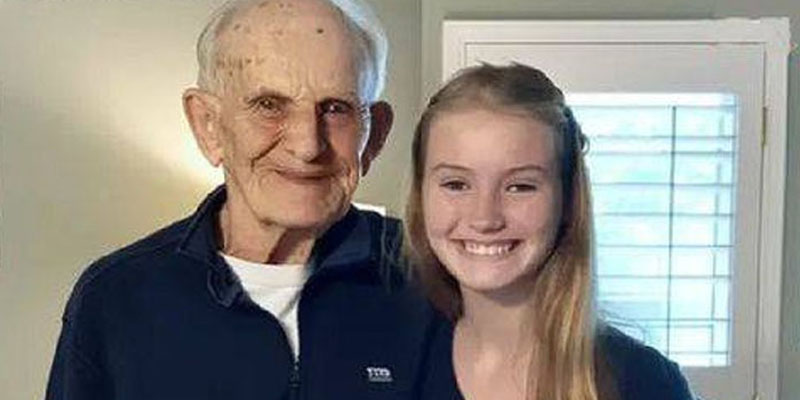As I stood beside my grandfather’s grave, my fingers dug deep into the pockets of a too-small black dress, desperately seeking warmth. The chilly October breeze carried the voice of the priest, which merged with the rustle of dry leaves. It was the saddest day of my life, and yet, the sorrow I felt seemed to stand alone against a backdrop of something entirely different.
The rest of my family wasn’t mourning Grandpa; they were seething. He had left each of them a measly one-dollar inheritance, and their outrage hung in the air, thick and bitter. It seemed to overshadow even the funeral itself. Uncle Vic and Aunt Nancy, my mother’s siblings, wore tight expressions, a mix of disbelief and anger. My mother stood beside me, her arms crossed firmly across her chest, her lips pressed into a thin line.
“One dollar each,” Aunt Nancy hissed under her breath. “One damn dollar! That man had plenty of money. How could he do this to us?”
Uncle Vic shook his head, letting out a sarcastic laugh. “Spiteful old man. I swear he planned this just to piss us off.”
“Typical Dad,” my mom muttered, her eyes narrowing. She shot me a sideways glance, her suspicion obvious. “Dahlia was always his favorite. I bet she got more than the rest of us.”
I kept my eyes glued to Grandpa’s coffin, feeling the weight of their resentment. They were all so angry, so consumed with what they believed they deserved. It was sad, really. I hadn’t received anything more than they had—only a single dollar bill—but I also wasn’t interested in Grandpa’s money. I wasn’t here for that.
Grandpa had meant everything to me. He was the only one who truly saw me, who didn’t think of me as the mistake or the spare kid that nobody noticed. He had taken me in when no one else in the family seemed to care. He’d always told me stories, shared laughs, and made me feel like I mattered. He made me feel at home, even when my actual home didn’t. I brought him a red rose for his coffin—the only red flower amongst the white daisies that everyone else had laid on his casket. It seemed fitting; he had always stood out, after all.
“What did he leave you, Dahlia?” Aunt Nancy’s voice snapped me out of my thoughts. Her eyes were sharp and accusing, her gaze piercing through me. “Don’t act like you didn’t get something. Spill it.”
“I got the same as all of you,” I replied, my voice steady despite the tension.
My mom’s hand clamped down on my shoulder, her nails digging slightly into my skin. “Are you sure? You spent all that time with him. Think, Dahlia. He must have told you something.”
Memories of Grandpa’s goofy stories rushed back. Stories of long-lost treasures and the butterscotch candies he always kept in his coat pocket. Sometimes he’d wink at me and say, “One day, kiddo, I’m going to leave you a real treasure.” I had always assumed it was just a game—one of his many jokes.
I shook my head slowly, turning back to the coffin. “What Grandpa gave me was his love and his stories. That was more than enough.”
“Nobody cares about that sentimental crap,” my mom snapped, her eyes narrowing. “Think! Where did all his money go?”
I shrugged. The truth was, I didn’t know, and I didn’t care. Grandpa’s money didn’t mean anything to me. All I wanted was for him to be here, to tell me one more story, to make me laugh. But he was gone, and they only seemed to care about slapping a price tag on his absence.
When they realized I had nothing of value for them, they turned their backs, their voices growing louder as they walked away, arguing with each other about lawyers and last wishes. It made me sick—this scramble over something as meaningless as inheritance. I closed my eyes, hoping the wind would blow away the sound of their bitter words.
“You must be Dahlia,” a soft voice spoke beside me.
I opened my eyes to see an elderly woman, maybe in her sixties, standing next to me. She wore a simple coat, and a worn leather bag hung over her shoulder. Her eyes were kind, her expression gentle, as if she understood something no one else did.
“I was a friend of your grandpa’s,” she said, leaning in conspiratorially. “He asked me to give you this.” She slipped a small folded piece of paper into my hand, her fingers briefly brushing mine. “Make sure no one else sees it,” she whispered. “Especially your family.”
Before I could say anything, she disappeared into the crowd of mourners, as if she’d never been there at all. My heart began to pound as I looked down at the paper, my fingers trembling as I slowly unfolded it.
